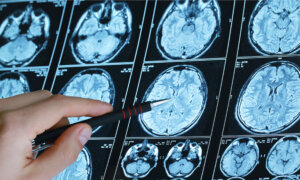Approximately one-fourth of people in the United States aged 65 and older are in only fair or poor health. Although we can’t change our chronological age, various lifestyle practices can slow biological aging and delay the onset of chronic disease and frailty.
Biological age refers to the health of the cells and tissues, which is dependent upon an array of genetic and environmental factors.
A new clinical trial found that omega-3 fatty acid supplements have a small slowing effect on biological aging. Additional slowing occurs when these supplements are combined with vitamin D supplements and home exercise.
An influential member of the natural health community, Dr. Joseph Mercola, a board-certified family medicine osteopathic physician, agrees that lifestyle factors can slow aging, yet he takes issue with some of the trial’s findings.
“Relying solely on supplements is a poor substitute to get the nutrients your body was built to receive,” he told The Epoch Times in an email.
Findings
The clinical trial, called the DO-HEALTH trial and published in Nature Aging, involved a prior phase and a current phase. The prior phase found three interventions linked to better health in aging, and the current phase found that the interventions were also linked to better biological aging.
Interventions Link to Improved Health
Lead author Dr. Heike A. Bischoff-Ferrari, a clinical researcher and specialist in geriatric medicine at the University of Zurich, discussed the findings in an email with The Epoch Times.
The prior phase of the same trial had more than 2,100 generally healthy adult participants aged 70 and older.
“We found omega-3 fatty acid supplements lowered the rate of falls by 10 percent and reduced the rate of infections by up to 13 percent,“ she said. ”Also, the combination of omega-3, vitamin D, and exercise lowered the risk of pre-frailty by 39 percent and invasive cancer by 61 percent.”
Pre-frailty refers to early negative health effects that develop before the onset of functional decline, which is the point at which performing everyday tasks becomes difficult.
Interventions Slow Biological Aging
Because of the health benefits found in the prior phase, the research team undertook the current phase to explore whether the interventions could slow biological aging. To determine this, they studied the most reliable molecular markers of biological age: epigenetic clocks.
Epigenetics refers to the genes with which we are born, the expression of those genes, and how this expression changes over time because of environmental factors.
Co-author of the clinical trial Steve Horvath, inventor of epigenetic clocks and principal investigator at Altos Labs, explained the concept of epigenetic clocks to The Epoch Times in an email.
“Epigenetic clocks depict aging at the molecular level,” he said. “They allow researchers to estimate a person’s age and mortality risk based on chemical modifications in DNA. These changes don’t alter the DNA sequence, but they can affect genetic expression, which governs how genes function. This is like a dimmer switch controlling the brightness of a light.”
The current phase of the DO-HEALTH trial involved 777 participants older than 70 and spanned a three-year period. The researchers tested eight treatments consisting of various combinations of the following, in addition to a placebo group:
- Taking a supplement of 1 gram of omega-3 fatty acids from marine algae per day
- Taking a supplement of 2,000 international units (IU) of vitamin D per day
- Engaging in 30 minutes of strength training at home three times per week
“Our findings from epigenetic clocks provide a strong signal that omega-3 supplementation slows biological aging in humans,” Bischoff-Ferrari said. “Additionally, the combination of omega-3s with vitamin D and exercise may make this effect even stronger. Biological age was slowed by 3–4 months in 3 years.”
She noted that although the effects seem small, if sustained, they may have relevant implications for population health.
Omega-3 Fat: Supplements or Diet?
A 2020
review published in Nutrients supports the DO-HEALTH trial finding that linked omega-3 fatty acid supplements to better aging. It indicated that the supplements might reduce inflammation associated with certain chronic medical conditions, which develop more often as people age. An example is the loss of muscle mass and strength linked to frailty. However, the quality of evidence regarding the use of these supplements is sometimes considered low, so further research is necessary, the authors concluded.
Mercola disagrees with the part of the DO-HEALTH trial that suggested omega-3 fatty acid supplements may slow aging. Instead, he advocates eating food sources of the nutrient.
“The anti-aging effects of omega-3 fatty acids are questionable at best,” he told The Epoch Times in an email. “While some studies suggest benefits, including the recent DO-HEALTH trial, your body can only utilize so much, and excessive intake—especially in supplement form—can backfire by raising your risk of a serious heart rhythm disorder called atrial fibrillation.”
A 2022 study published in Circulation documents this risk. It found that omega-3 fatty acids make the membrane of heart muscle cells thinner and more pliable, which changes its properties. This can affect the electrical activity of the heart needed for normal contractions.
Mercola noted that most of the early human benefits of omega-3 fatty acids were observed in populations consuming whole foods rich in the nutrients, such as wild-caught fish, rather than isolated supplements.
“Getting moderate amounts through the diet is enough to support overall health without the risks that [come] with high-dose supplementation,” he said.
Omega-3 Fatty Acid Food Sources
Most research on omega-3 fatty acids involves three types: alpha-linolenic acid (ALA), eicosapentaenoic acid (EPA), and docosahexaenoic acid (DHA).
The Dietary Guidelines for Americans advocates getting nutritional needs mainly through foods because they contain multiple nutrients and other components beneficial for health.
The recommended daily intake for omega-3 fatty acids is 1.6 grams (g) per day for men and 1.1 g per day for women, according to the National Institutes of Health. Below are food sources of omega-3s based on information from the USDA and the NIH.
Plant-based sources are rich in ALA and include:
- Flaxseeds (whole)–2.4 g per tablespoon (tbsp)
- Chia seeds–5 g per ounce (oz)
- English Walnuts–2.6 g per oz
- Hemp seeds–2.6 g per tbsp
Seafood sources are rich in ALA, EPA, and DHA and include:
- Salmon (wild, cooked)–1.6 g per 3 oz
- Sardines (canned in tomato sauce)–1.2 g per 3 oz
- Mackerel (Atlantic, cooked)–1.1 g per 3 oz
- Trout (rainbow, wild)–0.8 g per 3 oz
- Herring (cooked)–1.7 g per 3 oz
Vandana Sheth, a dietitian and plant-based diet author, made suggestions on how to get enough omega-3 fatty acids in the diet.
“To meet daily needs, for plant-based sources, aim for 1–2 servings of flaxseeds, chia seeds, or walnuts daily,” she told The Epoch Times in an email. “If relying on ALA sources, conversion to DHA and EPA is limited, so supplementing with algae oil can help. For those who eat seafood, aim for at least two servings of fatty fish per week to meet EPA and DHA recommendations.”
Vitamin D: Supplements or Sunlight?
“Vitamin D is crucial for immune modulation, inflammation control, and maintaining the health of mitochondria (cellular structures that are powerhouses of energy production)—all of which are key processes in cellular repair and longevity,” Mercola said. “This vitamin, together with exercise, [serves] as the primary, modifiable drivers of healthy aging.”
A 2023 review published in the International Journal of Molecular Sciences supports Mercola’s assertion that vitamin D has value for immunity, inflammation control, and mitochondrial function.
The authors also found that vitamin D affects the aging process through cellular homeostasis, which involves the regulation of factors needed to maintain the internal cellular environment, such as temperature, pH, and oxygen. For cells to function normally, their internal environment needs to be stable, which means temperature, pH, and oxygen must be within a certain range. Some studies have investigated the effectiveness of vitamin D supplements in conditions associated with aging, but standardized applications are lacking, the authors said.
Mercola said that although he believes that vitamin D is important in aging, he advises getting it through sunlight exposure rather than through diet or supplements.
“Vitamin D is not designed to be received primarily through food,” he said. “While some foods contain vitamin D, the human body is built to get it from the sun, which is nature’s best source. Early research on vitamin D and health benefits was based on sunlight exposure, not supplementation. Regular, moderate sunlight exposure—while always balancing skin protection—supports healthy vitamin D levels and may promote improved cellular repair and overall well-being.”
Antiaging and Exercise
A 2021
review published in Aging found that exercise is an effective tool to help prevent aging and promote longevity. Studies suggest that it has clinical and cellular benefits, which help with aging. Clinical benefits include helping preserve cognition, cardiovascular health, balance, muscle endurance, and skin structure, all of which decline with age. Cellular benefits include effects such as protection from genetic mutations and regulation of mitochondrial function, which are helpful, as mutations and mitochondrial dysfunction are two of the hallmarks of aging.
Mercola recommended a well-structured exercise regimen that encompasses moderate strength training and aerobic activity. He noted that this boosts the cells’ synthesis of mitochondria and improves insulin sensitivity and cardiovascular function, which are essential for preserving youthful cellular function.
“Engaging in a carefully dosed exercise program (targeting about 40–60 minutes per week) delivers robust anti-aging benefits,” Mercola said. “This strategy not only minimizes frailty and reduces the risk of chronic diseases but also provides a more efficient and sustainable approach to slowing aging at the molecular level.”
Supplement Side Effects and Precautions
People who choose to take omega-3 fatty acid and vitamin D supplements instead of getting the nutrients through diet and sunlight exposure should be aware of potential side effects and drug interactions.
Omega-3 Fatty Acids
The NIH reports that side effects of omega-3 fatty acid supplements are usually mild. They include heartburn, diarrhea, unpleasant taste, nausea, bad breath, headache, gastrointestinal discomfort, and odiferous sweat.
People who are on anticoagulant medications to prevent blood clots, such as Coumadin (warfarin), should take omega-3 fatty acid supplements only with caution and periodic monitoring. The supplements can reduce normal blood clotting, which would intensify the action of anticoagulants, according to a 2024 research article published in the National Library of Medicine. Negative interactions with other drugs can also happen, so it’s best to check with your doctor before starting on this or any other supplement.
People with a seafood allergy should also use caution when taking the supplements.
Vitamin D
High doses of vitamin D are toxic, according to the
NIH. The upper tolerable limit for people 9 years old or older is 100 micrograms or 4,000 IU.
Even regular doses of vitamin D can interact negatively with the following medications:
- Orlistat: This weight loss drug reduces the absorption of vitamin D.
- Steroids: Medications such as prednisone decrease inflammation, but they also hinder vitamin D metabolism.
- Thiazide diuretics: Medications such as chlorthalidone may cause high calcium levels, especially in people with impaired kidney function or high levels of parathyroid hormones.
Time marches on relentlessly, leaving the negative effects of aging in its wake; however, a variety of steps can help slow aging down.
“There is no single solution to slow aging—no single nutrient, supplement, or workout will extend your life on its own,” Mercola said. “Longevity depends on multiple systems working together, and key interventions like vitamin D and exercise support these systems in different but complementary ways. The bottom line? Nature designed your body to thrive on sunlight, movement, and whole foods.”













